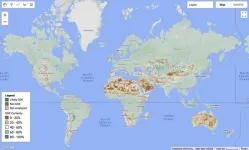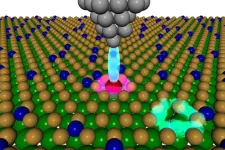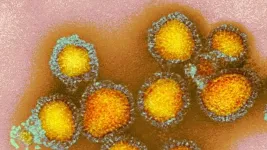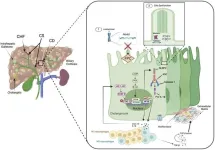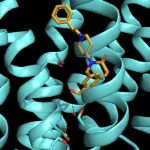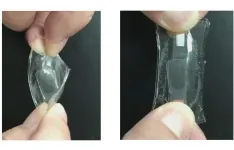(Press-News.org) The USC Schaeffer Institute for Public Policy & Government Service announced a new initiative today that leverages behavioral science to create more effective public policy.
The Behavioral Science & Policy Initiative at the USC Schaeffer Institute will conduct research to understand people’s beliefs and behaviors to create policies and communication that better fit people’s needs. The initiative will focus on policy topics such as climate change, health, and food insecurity.
“We want to help policymakers make a difference,” said Wändi Bruine de Bruin, the initiative’s director and Schaeffer Senior Scholar and Provost Professor of Public Policy, Psychology, and Behavioral Science at the USC Price School of Public Policy. “And that means creating policies and policy communication that better inform the people they want to reach.”
For example, Bruine de Bruin and her team interviewed U.S. residents about climate change terminology to inform how the United Nations’ Intergovernmental Panel on Climate Change (IPCC) communicates its findings. One of the interviewees summed up the findings by saying that communication about climate policies are often “talking way over people’s heads.”
“Our interviewees wanted climate change communication to use everyday language," Bruine de Bruin said. “The findings were consistent with our previous research showing that simple language makes information easier to understand. Even highly educated people prefer it.”
Behavioral science is a growing interdisciplinary field that combines insights from psychology, economics, and other social sciences to understand how people perceive risks, how they process information about risks, and what motivates attitude and behavior change.
The initiative is the first new policy area for the USC Schaeffer Institute since its formation was announced in February. The initiative will use the Schaeffer model, whereby academic experts share evidence-based research with policymakers.
“The Behavioral Science & Policy Initiative will establish the USC Schaeffer Institute as an international leader in using behavioral science to inform public policy for the betterment of society,” said Dana Goldman, director of the Schaeffer Institute.
The initiative will also foster interaction between behavioral scientists across USC, including faculty and students, through a co-hosted seminar series and events. Additionally, the initiative will support the Behavioral Science Society for undergraduate students, graduate students and postdocs.
The initiative is based at USC in Los Angeles but will take advantage of the USC Schaeffer Institute’s offices at the university’s Capital Campus in Washington, D.C.
An academic council composed of scholars from across USC will support the initiative. They are:
Allison Agsten, director, Center for Climate Journalism and Communication at USC Annenberg School of Communication and Journalism;
Joe Árvai, director, Wrigley Institute for Environment & Sustainability at USC Dornsife College of Letters, Arts and Sciences;
Jason Doctor, Norman Topping Chair in Medicine and Public Policy and Professor, USC Price School of Public Policy and Senior Scholar, USC Schaeffer Center for Health Policy & Economics;
Kayla de la Haye, research scientist, Center for Economic and Social Research at USC Dornsife;
Norbert Schwarz, Provost Professor of Psychology and Marketing, USC Dornsife and USC Marshall School of Business; and
Gülden Ülkümen, associate professor of marketing, USC Marshall School of Business.
The Schaeffer Institute
The USC Leonard D. Schaeffer Institute for Public Policy & Government Service develops evidence-based solutions to the nation’s most pressing policy issues and fosters civic engagement among the next generation of public service leaders. Established by an historic gift from Leonard D. Schaeffer, it houses two flagship programs: the Leonard D. Schaeffer Center for Health Policy & Economics and the Leonard D. Schaeffer Fellows in Government Service.
Since its inception in 2009, the USC Schaeffer Center for Health Policy & Economics has established itself as one the world’s top health policy research organizations. A joint enterprise with the Price School of Public Policy and the Mann School of Pharmacy, the Schaeffer Center is a recognized nonpartisan voice helping to shape health policy in Washington, DC.
The Leonard D. Schaeffer Fellows in Government Service program exposes undergraduate students to government work through full-time, high-level internships at the federal, state, and local levels. Schaeffer Fellows represent a diversity of backgrounds, political perspectives, and academic disciplines; common among them is their interest in public service and engaged citizenship. Since 2015, the program has supported 418 undergraduates from five partner universities at more than 200 different government offices and agencies.
Building on the successes of these programs, the Schaeffer Institute serves as a policy laboratory to develop and test ideas generated by the USC academic community and provides a forum to reach federal policymakers. It creates opportunities for students to engage in public service and develop an informed view of government. The Schaeffer Institute has offices at USC in Los Angeles and Washington, DC.
END
USC Schaeffer Institute launches new initiative to improve public policy through behavioral science
Climate change, health and food insecurity will be major focuses of the new initiative
2024-07-17
ELSE PRESS RELEASES FROM THIS DATE:
Groundwater is key to protecting global ecosystems
2024-07-17
(Santa Barbara, Calif.) — Where hidden water tables meet the Earth’s surface, life can thrive even in the driest locations. Offering refuge during times of drought, shallow groundwater aquifers act like water savings accounts that can support ecosystems with the moisture required to survive, even as precipitation dwindles. As climate change and human water use rapidly deplete groundwater levels around the world, scientists and policy makers need better data for where these groundwater-dependent ecosystems exist.
Now, a new study maps ...
A new approach to accelerate the discovery of quantum materials
2024-07-17
– By Michael Matz
Researchers at the Department of Energy’s Lawrence Berkeley National Laboratory (Berkeley Lab) and several collaborating institutions have successfully demonstrated an innovative approach to find breakthrough materials for quantum applications. The approach uses rapid computing methods to predict the properties of hundreds of materials, identifying short lists of the most promising ones. Then, precise fabrication methods are used to make the short-list materials and further ...
Influenza viruses can use two ways to infect cells
2024-07-17
Most influenza viruses enter human or animal cells through specific pathways on the cells’ surface. Researchers at the University of Zurich have now discovered that certain human flu viruses and avian flu viruses can also use a second entry pathway, a protein complex of the immune system, to infect cells. This ability helps the viruses infect different species – and potentially jump between animals and humans.
The majority of type A influenza viruses circulating in birds and pigs aren’t normally a health ...
Engineering resilience: Advanced FEM enhances earthquake impact assessment
2024-07-17
In a significant advancement for geotechnical engineering, a refined space-time finite element method (v-ST/FEM) has been introduced to tackle the complex dynamics of soil-structure interaction during seismic events. This new approach allows for more accurate simulations of the response of earth structures to earthquake vibrations, marking a crucial step in improving infrastructure resilience against natural disasters.
Designing structures like dams, tunnels, and embankments to withstand transient loads from sources such as earthquakes, high-speed trains, and explosions requires robust dynamic soil-structure interaction (SSI) analysis. Traditional methods often fall short in handling ...
The Vps21 signaling pathway regulates white-opaque switching and mating in Candida albicans
2024-07-17
This study was led by Dr. Guanghua Huang (School of Life Sciences, Fudan University). The team discovered that the conserved Vps21 signaling pathway plays critical roles in the regulation of white-opaque switching and mating in Candida albicans, a major human fungal pathogen.
Candida albicans is able to cause cutaneous diseases as well as life-threatening systemic infections in humans. It has multiple cellular morphologies and can undergo transitions among different morphologies to adapt to environmental changes. White-opaque transitions represent a typical morphological phenotypic switching system ...
Autoantibodies behind lifelong risk of viral infections
2024-07-17
A new study shows that about two percent of the population develop autoantibodies against type 1 interferons, mostly later in life. This makes individuals more susceptible to viral diseases like COVID-19. The study, conducted by UZH researchers together with a USZ team, is based on an analysis of a large collection of historical blood samples.
Virus infections trigger the cells of the immune system to release type 1 interferons. These proteins act as early messengers that warn uninfected cells and tissues that a virus is spreading. This allows ...
Heritable chronic cholestatic liver diseases
2024-07-17
Chronic cholestasis, defined as the impairment of bile acid formation and/or flow persisting for more than six months, encompasses a broad spectrum of hepatobiliary disorders, both heritable and acquired. This review focuses on heritable causes of chronic cholestasis, which, although less common, present significant clinical challenges. Heritable chronic cholestatic liver diseases are typically diagnosed in childhood, but many cases present and persist into adulthood. This review aims to highlight the genetics, clinical pathophysiology, presentation, ...
What fat cats on a diet may tell us about obesity in humans
2024-07-17
COLUMBUS, Ohio – Pet cats may be excellent animal models for the study of obesity origins and treatment in humans, a new study of feline gut microbes suggests – and both species would likely get healthier in the research process, scientists say.
Veterinary researchers analyzed fecal samples from fat cats as the animals lost and maintained weight over the course of four dietary changes, including strict calorie reduction. The team found that food-related changes to the cats’ gut microbiome – the assortment ...
Designing safer opioids
2024-07-17
Opioid medications offer people relief from debilitating pain, but these drugs come with dangers: the risk for addiction, miserable withdrawal symptoms and the potential for fatal overdose. In a study in ACS Central Science, researchers have identified a strategy to design safer opioids. They showed that an experimental opioid, which binds to an unconventional spot in the receptor, suppresses pain in animal models with fewer side effects — most notably those linked to fatal overdoses.
Opioid medications tap into the body’s natural system for mitigating pain by activating pain-suppressing ...
Completely stretchy lithium-ion battery for flexible electronics
2024-07-17
When you think of a battery, you probably don’t think stretchy. But batteries will need this shape-shifting quality to be incorporated into flexible electronics, which are gaining traction for wearable health monitors. Now, researchers in ACS Energy Letters report a lithium-ion battery with entirely stretchable components, including an electrolyte layer that can expand by 5000%, and it retains its charge storage capacity after nearly 70 charge/discharge cycles.
Electronics that bend and stretch need batteries with similar properties. Most researchers who have ...
LAST 30 PRESS RELEASES:
ASU researchers to lead AAAS panel on water insecurity in the United States
ASU professor Anne Stone to present at AAAS Conference in Phoenix on ancient origins of modern disease
Proposals for exploring viruses and skin as the next experimental quantum frontiers share US$30,000 science award
ASU researchers showcase scalable tech solutions for older adults living alone with cognitive decline at AAAS 2026
Scientists identify smooth regional trends in fruit fly survival strategies
Antipathy toward snakes? Your parents likely talked you into that at an early age
Sylvester Cancer Tip Sheet for Feb. 2026
Online exposure to medical misinformation concentrated among older adults
Telehealth improves access to genetic services for adult survivors of childhood cancers
Outdated mortality benchmarks risk missing early signs of famine and delay recognizing mass starvation
Newly discovered bacterium converts carbon dioxide into chemicals using electricity
Flipping and reversing mini-proteins could improve disease treatment
Scientists reveal major hidden source of atmospheric nitrogen pollution in fragile lake basin
Biochar emerges as a powerful tool for soil carbon neutrality and climate mitigation
Tiny cell messengers show big promise for safer protein and gene delivery
AMS releases statement regarding the decision to rescind EPA’s 2009 Endangerment Finding
Parents’ alcohol and drug use influences their children’s consumption, research shows
Modular assembly of chiral nitrogen-bridged rings achieved by palladium-catalyzed diastereoselective and enantioselective cascade cyclization reactions
Promoting civic engagement
AMS Science Preview: Hurricane slowdown, school snow days
Deforestation in the Amazon raises the surface temperature by 3 °C during the dry season
Model more accurately maps the impact of frost on corn crops
How did humans develop sharp vision? Lab-grown retinas show likely answer
Sour grapes? Taste, experience of sour foods depends on individual consumer
At AAAS, professor Krystal Tsosie argues the future of science must be Indigenous-led
From the lab to the living room: Decoding Parkinson’s patients movements in the real world
Research advances in porous materials, as highlighted in the 2025 Nobel Prize in Chemistry
Sally C. Morton, executive vice president of ASU Knowledge Enterprise, presents a bold and practical framework for moving research from discovery to real-world impact
Biochemical parameters in patients with diabetic nephropathy versus individuals with diabetes alone, non-diabetic nephropathy, and healthy controls
Muscular strength and mortality in women ages 63 to 99
[Press-News.org] USC Schaeffer Institute launches new initiative to improve public policy through behavioral scienceClimate change, health and food insecurity will be major focuses of the new initiative
